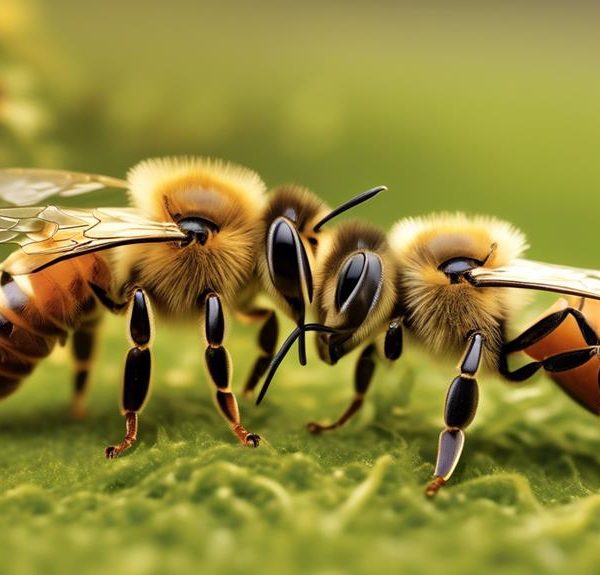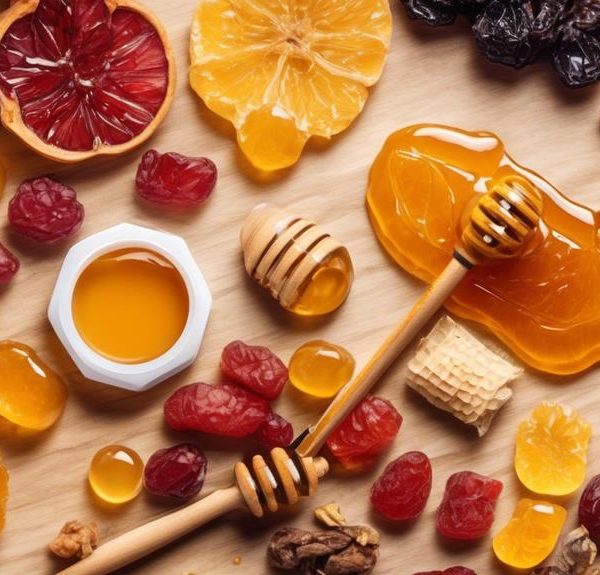Know the surprising facts about feeding honey to your hamster; is it a sweet treat or a potential health risk?
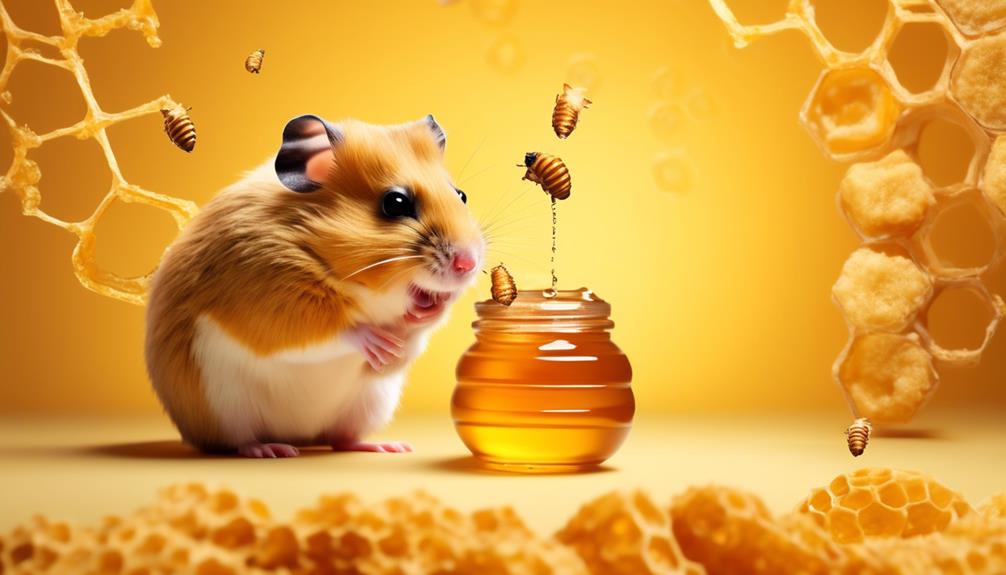
Are Hamsters Allowed Honey
Did you know that over 1.4 million households in the U.S. own hamsters? As a hamster owner, you're likely always searching for information to provide the best care for your little friend.
One question that often comes up is whether hamsters can eat honey. While honey is a natural sweetener loved by many, it's important to consider if it's suitable for your hamster's diet.
As we explore this topic further, you'll uncover surprising facts about the impact of honey on your hamster's health.
Key Takeaways
- Hamsters should avoid honey due to its high sugar content and potential health risks.
- Excessive sugar intake, such as from honey, can lead to obesity, diabetes, and other health issues in hamsters.
- Opt for safe and low-sugar alternatives like fruits (apples, pears, peaches) and vegetables (carrots, bell peppers, cucumbers) for hamsters' occasional sweet cravings.
- Moderation and quality control are essential in hamster diets to prevent health complications related to sugar consumption.
Understanding Hamster Dietary Needs
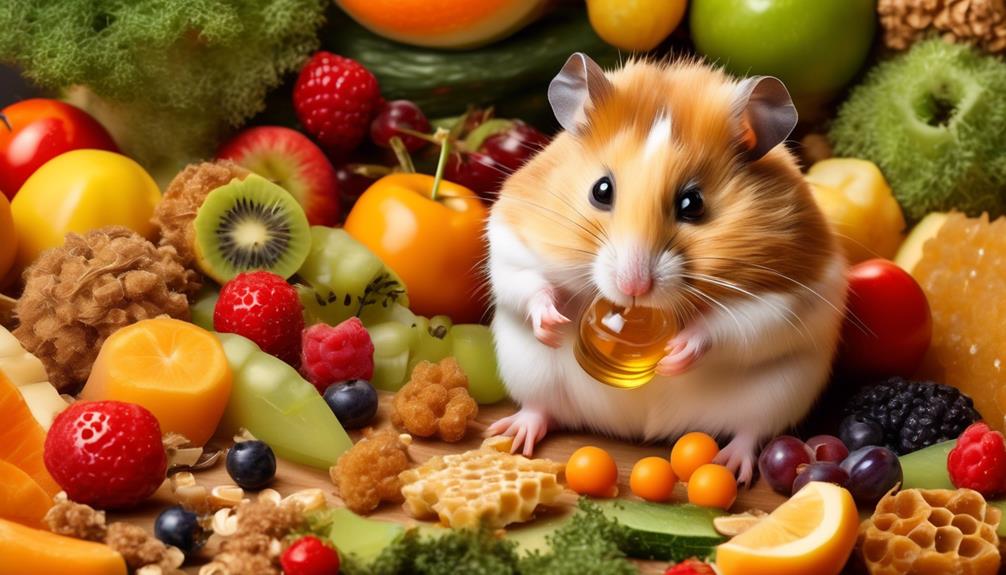
To properly care for your hamster, it's essential to understand their dietary needs, as their health hinges greatly on a balanced and suitable diet. Hamsters are omnivores, meaning they require a mix of both plant-based and animal-based foods. A typical diet consists of hamster pellets, seeds, fruits, vegetables, and a small amount of protein.
However, not all food is safe for your furry friend. Some fruits, like citrus and apple seeds, can be harmful to them. In addition, sugary and fatty foods should be limited due to hamsters' susceptibility to diabetes and obesity. It's also crucial to provide fresh water daily and to replace stale food promptly to avoid bacterial growth.
Changing the diet abruptly can upset your hamster's stomach, so gradual changes are recommended. Likewise, treat foods, such as honey, should be given sparingly and monitored closely for any adverse reactions. Understanding your hamster's dietary needs isn't only about knowing what foods are safe, but also about maintaining the right balance and being mindful of their unique digestion process.
Nutritional Value of Honey
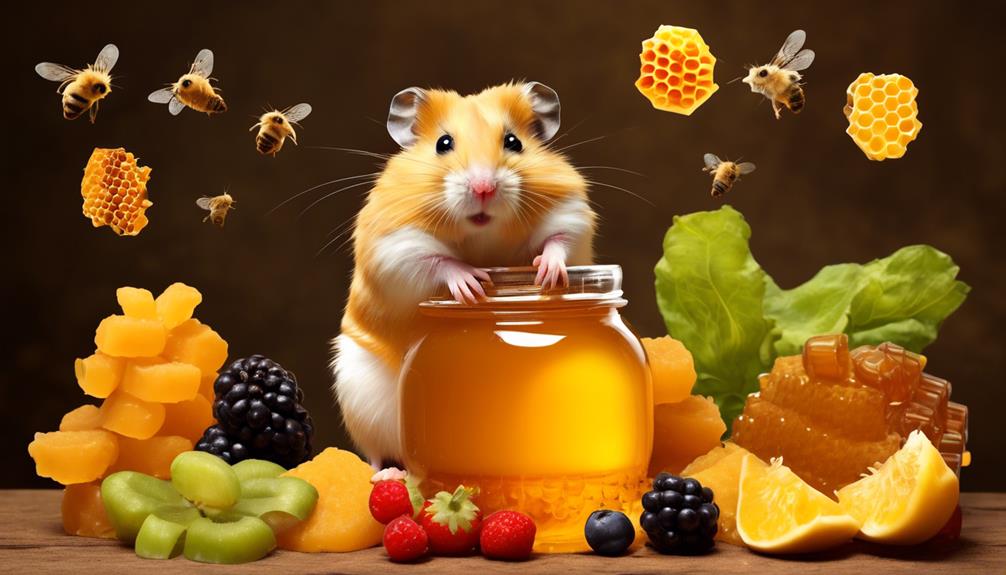
While honey is often touted for its numerous health benefits in humans, it's important to consider its nutritional value in relation to your hamster's dietary needs. Honey, a sweet liquid produced by bees, is a powerhouse of essential nutrients. It's rich in vitamins and minerals, including vitamin C, calcium, iron, and potassium. It also contains antioxidants which can protect the body against damage from harmful free radicals.
However, the high sugar content in honey poses a potential risk to your hamster's health. Hamsters have a very small body size and their digestive system isn't built to handle a high intake of sugars. A diet high in sugar can lead to obesity and diabetes in hamsters, which are serious health conditions that can be life-threatening.
Moreover, honey is a dense source of calories. Just a tablespoon of it contains approximately 64 calories. Given the small size of hamsters, even a small amount of honey would constitute a large portion of their daily calorie intake.
The Dangers of Honey for Hamsters
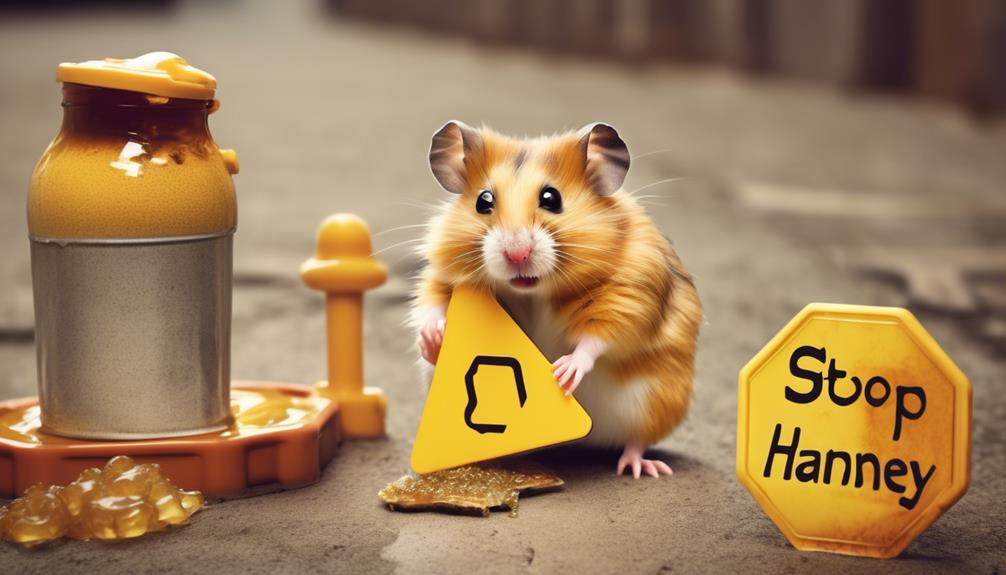
Despite its nutritional value, regularly feeding your hamster honey can lead to several health issues. Honey's high sugar content can cause obesity in hamsters, leading to diabetes, heart disease, and other related health problems. Furthermore, honey's sticky texture can stick to your hamster's fur and cause it to become matted and unclean, leading to potential skin infections.
Danger | Explanation | Prevention |
|---|---|---|
Obesity | Honey's high sugar content can lead to weight gain. | Limit honey in diet. |
Diabetes | Obesity can further lead to diabetes. | Ensure balanced diet. |
Infections | Sticky honey can cause fur to mat and lead to skin infections. | Regular grooming. |
In addition, honey can contain botulinum spores, harmful to your hamster's health. These spores can cause botulism, a severe condition that can be fatal if untreated. It's also important to note that not all honey is created equal. Processed honey often contains additives and preservatives that can harm your hamster. So, if you're considering feeding your hamster honey, ensure it's in moderation and is of high quality. Remember, your hamster's health should always be your top priority.
The Impact of Sugar on Hamsters
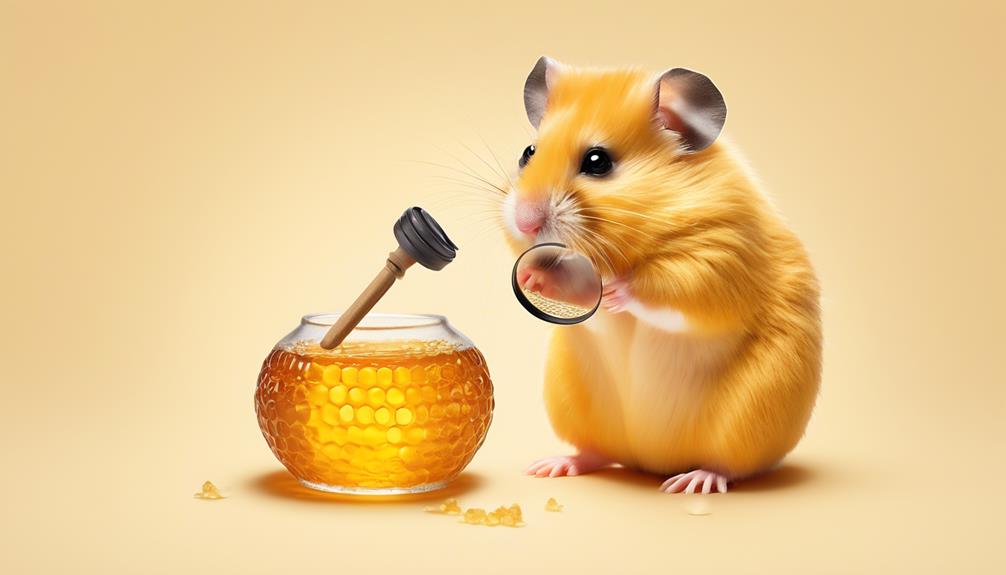
Building on the concerns associated with honey, it's worth exploring further how sugar, in general, impacts your hamster's health. Enhanced sugar intake can lead to obesity, diabetes, tooth decay, and other health issues in hamsters, just like in humans. These conditions can drastically reduce your pet's lifespan and quality of life.
Hamsters have small bodies, so they can't handle large amounts of sugar. Their digestive systems are adapted to a diet high in fiber and low in sugar. Feeding them sugar-rich foods, including honey, could disrupt their digestive process and lead to stomach issues.
Excessive sugar also affects a hamster's dental health. They've continually growing teeth, which is why they constantly gnaw on things. Consuming too much sugar can lead to tooth decay and oral problems, which, if untreated, can cause pain and difficulties in eating.
The high sugar content in honey is also linked to diabetes in hamsters. This disease can lead to a myriad of complications, including cataracts, hind leg paralysis, and even death.
Therefore, it's crucial to control your hamster's sugar intake to maintain their optimal health. Remember, moderation is key.
Healthy Alternatives to Honey for Hamsters
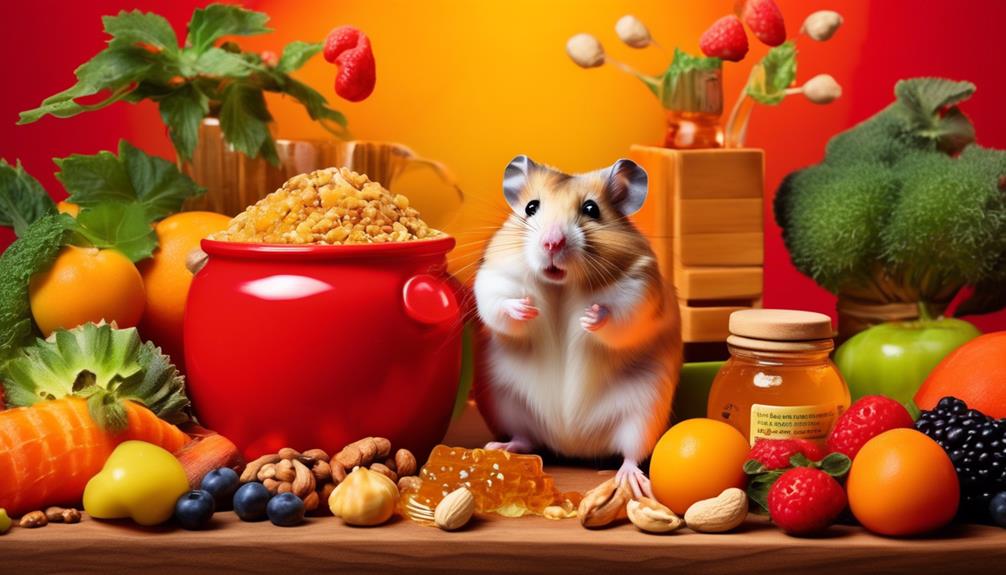
If you're looking for healthier alternatives to honey for your hamster, there are plenty of options that can satisfy their sweet tooth while providing essential nutrients. It's important to remember that hamsters have specific dietary needs, so it's crucial to choose foods that are safe and beneficial for them.
Consider giving your hamster fruits like apples, pears, and peaches. These fruits not only satisfy their craving for sweetness but also provide an array of vitamins and minerals. However, remember to serve these in moderation due to their sugar content.
You can also incorporate vegetables like carrots, bell peppers, and cucumbers into their diet. These veggies are low in sugar and high in fiber, making them a great choice for your hamster.
Here is a simple table for quick reference:
Healthy Alternatives | Benefits |
|---|---|
Fruits (Apples, Pears) | High in Vitamins, Satisfy Sweetness |
Vegetables (Carrots) | High in Fiber, Low in Sugar |
Bell Peppers, Cucumbers | Low in Sugar, High in Fiber |
Conclusion
In summary, while honey holds nutritional value, it's not a safe bet for your hamster's diet due to the potential health risks. The high sugar content can lead to obesity and diabetes.
So, it's vital to stick to foods specifically recommended for hamsters. There are plenty of healthy alternatives that can provide the nutrients your furry friend needs without the risk.
Remember, your hamster's health is in your hands – always choose wisely.

